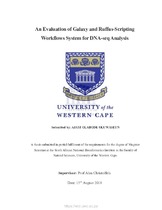| dc.description.abstract | Functional genomics determines the biological functions of genes on a global scale by
using large volumes of data obtained through techniques including next-generation
sequencing (NGS). The application of NGS in biomedical research is gaining in
momentum, and with its adoption becoming more widespread, there is an increasing
need for access to customizable computational workflows that can simplify, and offer
access to, computer intensive analyses of genomic data. In this study, the Galaxy and
Ruffus frameworks were designed and implemented with a view to address the
challenges faced in biomedical research. Galaxy, a graphical web-based framework,
allows researchers to build a graphical NGS data analysis pipeline for accessible,
reproducible, and collaborative data-sharing. Ruffus, a UNIX command-line framework
used by bioinformaticians as Python library to write scripts in object-oriented style,
allows for building a workflow in terms of task dependencies and execution logic. In
this study, a dual data analysis technique was explored which focuses on a comparative
evaluation of Galaxy and Ruffus frameworks that are used in composing analysis
pipelines. To this end, we developed an analysis pipeline in Galaxy, and Ruffus, for the
analysis of Mycobacterium tuberculosis sequence data. Furthermore, this study aimed
to compare the Galaxy framework to Ruffus with preliminary analysis revealing that the
analysis pipeline in Galaxy displayed a higher percentage of load and store instructions.
In comparison, pipelines in Ruffus tended to be CPU bound and memory intensive. The
CPU usage, memory utilization, and runtime execution are graphically represented in
this study. Our evaluation suggests that workflow frameworks have distinctly different
features from ease of use, flexibility, and portability, to architectural designs. | en_US |

